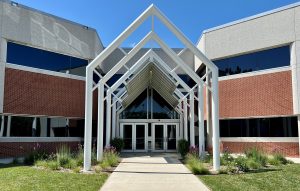
The Center for Nondestructive Evaluation (CNDE) was established in 1985 as a National Science Foundation (NSF) Industry/University Cooperative Research Center (I/UCRC). NDE plays an important role in ensuring the safe use of engineered systems. CNDE has a long history of working with industry to provide cost-effective tools and solutions which address relevant problems for a variety of industrial sectors and applications.
Nondestructive evaluation (NDE) is the science, engineering and application of evaluating a system or structure without affecting its future usability and functionality. NDE plays a critical role in the safety and economics of many of our engineered systems, systems for which performance demands are ever increasing. As critical and costly engineered systems age, the focus turns to life extension and the desire to continue use beyond the original design goal using risk-informed decision-making processes. Proper inspection leads to detecting the presence of age- or service-induced fatigue and damage.
With over 30 scientists and engineers, and a 52,000 sq. ft. facility adjacent to Iowa State University (ISU) campus, CNDE is the premier US research organization for the development and application of inspection and sensing technologies. Extensive materials characterization studies and inspection system developments have been applied and implemented for metals, ceramics, and composites of interest to a number of industrial sectors. Experimental and theoretical capabilities are available for the full range of inspection methods including: ultrasonics, acoustics, electromagnetics, radiography, magnetic particle, liquid penetrant, thermal, ground-penetrating radar, microwave, millimeter wave and terahertz. Among many accomplishments is development and commercialization of simulation models for the three major inspection modalities, eddy current (ECSIM), ultrasonics (UTSIM), and radiography (XRSIM), which are used in inspection optimization, detectability studies and training. These simulation tools enable time efficient parametric studies which allow NDE engineers to optimize their inspection needs as a function of geometry, materials properties and flaw types of interest. The fundamental understanding of inspection physics embodied in the simulation tools and applied in innovative measurement approaches are at the heart of CNDE’s accomplishments.